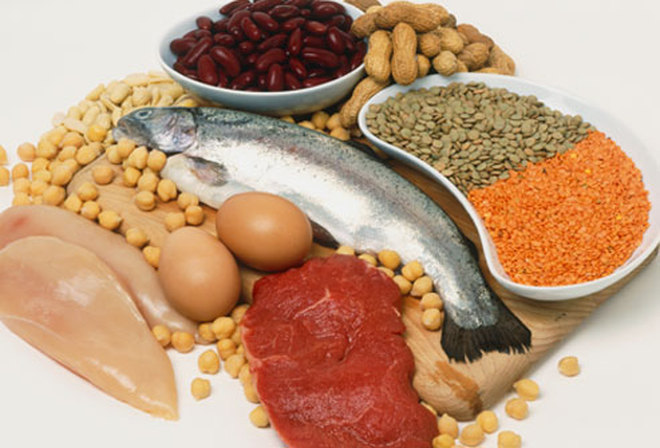
What Are Proteins?
Proteins are long chains of amino acids that are the essential components of any living organism. Proteins are very important to ensure that the body functions properly. Our bodies cannot live without proteins.
It is important to remember that protein accounts for 20% of the body’s weight approximately
Why Do You Need Proteins?
Proteins are one of the essential components of the body. This makes it absolutely impossible for our organs to continue functioning without the presence of protein in the body. Many of the important functions that involve proteins can include:
Strengthening of body tissues – hairs, nails, muscles, etc.
Production of antibodies
Production of hormones
Muscle contractions
Production of enzymes
Storage of essential vitamins and minerals. One example is iron.
Sources of Proteins
Proteins are found several kinds of foods. Here are some of the richest sources of proteins. (See also: Best sources of protein for vegetarians)
Turkey
Cheese
Beef
Tofu
Beans
How Much Protein Do You Need In Your Diet?
Daily Protein Intake:
Everyone usually fulfills their protein needs with their diet. Protein deficiencies are rare in developed countries because people can easily obtain their protein levels with the meals they eat. However, protein overload may be seen in some people. It may result in different medical conditions like gout, obesity, etc.
Protein Needs of an Ordinary Person
Different people have different needs depending on their body weight, lifestyle, and health. The daily protein need of a person can be calculated using the following formula:
- Body weight in kilograms (Kg) x 0.8 → Minimum amount of proteins in grams needed by the body
- Body weight in pounds (Kg) x 1.7 → Maximum amount of proteins in grams needed by the body
Or
- Body weight in pounds (lbs) x 0.37 → Minimum
- Body weight in pounds (lbs) x 1.8 → Maximum
The formulas mentioned above give you the minimum and maximum grams of proteins that you need every day.
Protein Needs of Special Individuals
Not everyone requires the same amount of proteins. The daily protein requirements of a person vary from person to person depending on their body weight, lifestyle, and their health condition. The term “special individuals” does not mean that they have some sort of super power; it just means that they are different from ordinary people. Special people include:
Athletes: People who are very active, especially runners require much more protein than ordinary individuals. This is because proteins play an important role in the strengthening of muscles. If athletes do not intake sufficient amount of proteins, their muscles do not get enough energy which may cause muscle cramps, tightness, weakness, and eventually muscle wasting.
- Body weight in kilograms (Kg) x 1.2 = grams of proteins needed
- Body weight in pounds (lbs) x 0.58 = grams of proteins needed by an athlete
Body builders: People who love performing heavy weight exercises are highly dependent on protein. They would never be able to make muscles if they do not take protein in excess.
- Body weight in kilograms (Kg) x 1.5 = grams of proteins needed
- Body weight in pounds (lbs) x 0.70 = grams of proteins needed by an athlete
Pregnant women: It is necessary for pregnant women to meet their body’s daily protein requirement. During pregnancy, women may suffer from slight increase in blood pressure which referred to as preeclampsia in medical terminology. In this condition proteins are excreted out of the body along with the urine which may cause protein deficiency. It may be harmful for the fetus. Therefore it is necessary for pregnant women to have a diet that is rich in protein.
- Body weight in kilograms (Kg) x 1.3 = grams of proteins needed
- Body weight in pounds (lbs) x 0.65 = grams of proteins needed by an athlete
People suffering from gout: An increased level of uric acid in the blood is called gout. It is a condition that affects your joints and causes pain in small joints. It is caused due to an excessive amount of proteins in their diet. People suffering from gout must cut down the amount of protein that they are eating per day.
People who have developed gastrointestinal disorders: Proteins are unquestionably very useful and important for the body but proteins may cause harm to the people who have a defective digestive system, especially the people who have developed ulcers. Such people should avoid intake of proteins and should try to consume lesser proteins. This is because proteins activate our digestive system which worsens the ulcer pain.
Injured people: Proteins tend to increase the healing of muscles and skin. It is necessary for injured individuals to consume some extra proteins to increase the healing power.
Is Excessive Protein Harmful?
Remember, anything in excess is harmful – some are more, some are less. Proteins, if taken in excess, may cause excessive production of ketones and ketone bodies. Ketone bodies produce bad breath – halitosis. Besides that, higher level of proteins may increase muscle mass which may cause muscle tightening which results in declining of proper functioning of the organs, especially the heart.
Proteins, when in excess, begin to convert into uric acid which later on forms uric acid crystals. These uric acid crystals tend to accumulate in small joints causing joint pain. This condition is called gout.
What If I Do Not Meet My Daily Protein Requirements?
Your body needs to meet the minimum daily protein intake each day. People who fail to maintain their body’s protein levels for a long period of time tend to suffer from various disorders. Muscle wasting is one of the most harmful effects of protein deficiency. Proteins are required to hold the blood inside the vessels. In the case of protein deficiency, blood starts to leak out of the vessels which results in general edema. Frequent infections, weight loss, and muscle weakness are caused due to protein insufficiency.
